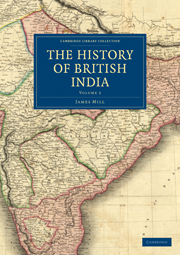Book contents
- Frontmatter
- Contents
- BOOK VI FROM THE ESTABLISHMENT OF THE NEW CONSTITUTION FOR THE GOVERNMENT OF INDIA, A° 1784, TO THE TERMINATION OF THE WAR WITH THE MAHRATTAS, A° 1805
- CHAPTER I
- CHAPTER II
- CHAPTER III
- CHAPTER IV
- CHAPTER V
- CHAPTER VI
- CHAPTER VII
- CHAPTER VIII
- CHAPTER IX
- CHAPTER X
- CHAPTER XI
- CHAPTER XII
- CHAPTER XIII
- INDEX
- Frontmatter
- Contents
- BOOK VI FROM THE ESTABLISHMENT OF THE NEW CONSTITUTION FOR THE GOVERNMENT OF INDIA, A° 1784, TO THE TERMINATION OF THE WAR WITH THE MAHRATTAS, A° 1805
- CHAPTER I
- CHAPTER II
- CHAPTER III
- CHAPTER IV
- CHAPTER V
- CHAPTER VI
- CHAPTER VII
- CHAPTER VIII
- CHAPTER IX
- CHAPTER X
- CHAPTER XI
- CHAPTER XII
- CHAPTER XIII
- INDEX
Summary
Of the regulations, constituting this great revolution in the government of the Indian people, the natural consequences were, within a few years, pretty fully developed in practice; and the present is perhaps the occasion on which the instructive picture of them can with most advantage be presented to view. The trespass upon chronological order, in the case of events which scarcely fall into the ordinary channel of narration, will be amply compensated by the advantage of surveying, in immediate sequence, institutions and their results.
According to the order in which the institutions were considered, the consequences of the new system of finance come first to be described. Its more immediate object was, to establish a landed aristocracy in the persons of the Zemindars. That project, whatever character may be thought to belong to it, has completely failed.
In default of payment of their taxes on the part of the Zemindars, the security reserved for government was, to put up to sale as much of the land as would suffice to discharge the arrears. And on the important question, of judicature with a multitude of technical forms, or judicature without a multitude of technical forms, the Anglo-Indian government made a curious exhibition. They had established courts of law, and appointed for them a numerous list of forms, through which it required much time to pass. In their own case, however, it would, they perceived, be highly desirable to obtain speedy justice.
- Type
- Chapter
- Information
- The History of British India , pp. 292 - 362Publisher: Cambridge University PressPrint publication year: 2010First published in: 1817



